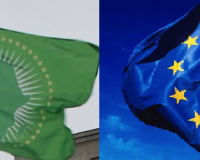 The Joint Africa-EU Strategy (JAES) – adopted in Lisbon in 2007 – was supposed to lay the foundations and principles of a paradigm shift in the relationship between Africa and Europe mainly based on aid dependence and the creed of free trade since the Cotonou Agreement signed in 2000.
The Joint Africa-EU Strategy (JAES) – adopted in Lisbon in 2007 – was supposed to lay the foundations and principles of a paradigm shift in the relationship between Africa and Europe mainly based on aid dependence and the creed of free trade since the Cotonou Agreement signed in 2000.
The Africa-EU Strategy and the implementation of the action plan, considered as the new policy framework for Africa-EU relations, aimed to create the conditions for a new political partnership between equals.
Seven years after the adoption of the JAES and in the light of a new Africa-Europe Summit, both sides agree to recognize
that the partnership was essentially technical and bureaucratic, and did not succeed to achieve either these ambitious goals nor a new dynamic in the relations between the two parts.
The African side meanwhile, has completed a critical evaluation of this partnership at a meeting held from june 10 to 13, 2013 in Zanzibar by the African Union, which brought together all the stakeholders mobilized by the JAES (Member States, Representatives of the AUC, NPCA-NEPAD, APRM, PAP, RECs, CSOs, Think tanks…). Beyond the analysis of difficulties in the implementation of the strategy and its fundamental flaws, it is important to ensure that the african side will speak with one voice on this issue at the next Summit.
This is obviously an approach and a political issue that should be seriously debated in the political organs of the
African Union.
The solemn declaration on the 50th anniversary of the OAU/AU adopted at the 21st Session of the Assembly of the Heads of State and Government on May 26, 2013 reiterated this need for Africa to speak with one voice and to act collectively in order to promote its interests and common positions in all its partnerships.
Prospects for the next Africa-Europe Summit on April 2014
The next meeting of the Heads of State and Government of the African Union in January 2014 represents the single biggest opportunity for them to make a political statement on the assessment of the Africa-EU strategy and on the expectations concerning the next Africa-EU Summit scheduled for April 2014.
On the european side, 2014 is the last year in office of the current European Commission under the direction of Mr. Barroso; and the european elections are scheduled for June 2014. It is obvious that for the last year of operation – and in a context of economic, political and social major crisis – the European Commission and the Member States do not consider Africa as a priority and have less the need to rebuild the foundations of a new partnership.
Moreover, the emergency of an aggiornamento of the european approach of partnership with Africa – taking into
account the major concerns of social and economic transformation of the continent – is not captured by the european side.
Read more on the Africa Governance Institute


